![[Home]](https://ludism.org/logo/sclogo160.png)
Seattle Cosmic met in West Seattle at the house of Dave Adams and Kathy Kizer on 5 April. Present, in rough order or attendance, were David_Adams?, Greg_Stripes?, Jon_Tanner?, and newcomer Jeff_Rosenfeld?; Dan_Crouch? and Alex_Swavely?; Ron_Hale-Evans? (me), John_Braley?, and Alex_Rockwell?; Steve_Vall\xE9e?; Nat_Dupree? and Steve_Dupree?; Dave_Howell?; ChadUrsoMcDaniel; and Eric_Yarnell,_ND?, for a total of 15 people. Kathy Kizer was present but did not participate in any games while I was there.
Dave and Kathy are moving to Tukwila, so this was the last meeting in their West Seattle house. As each player left for the evening, Dave would tell them (wittily, I thought), "I don't want to see your face in this house again!"
--Ron_Hale-Evans?
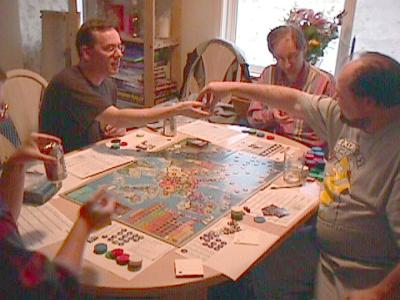
The Age of Renaissance players thematically re-enact the Sistine Chapel ceiling.
This meeting was a LongGameDay, as Dave and three other players met to play Age_of_Renaissance?, the sequel to Civilization. They started around 10 AM and ended around 6 PM, shortly after most of the other players arrived. Scores were as follows:
Scores
| PLAYER | SCORE |
| Greg S | 2573 |
| Jeff R | 2496 |
| Jon T | 1841 |
| Dave A | 719 |
Greg Stripes was awarded a rules pamphlet for Eleusis?, donated by its inventor, Robert Abbott. I believe he left shortly thereafter.
Comments from the players?
--Ron_Hale-Evans?
Around 5:30, four people took up Burn_Rate?, the card game of the dot-com death-march. At the end, only Alex Rockwell was left standing. He was awarded a yoyo in the shape of a U.S. quarter.
1. Burn Rate players.
2. Burn Rate cards.
Scores
| PLAYER | SCORE |
| Alex R | 13 |
| Alex S | eliminated 3rd |
| Dan C | eliminated 2nd |
| Steve V | eliminated 1st |
--Ron_Hale-Evans?
A fun game about the Dot-com era. Players represent dot-com companies with lots of funding and lots of bad ideas, such as "Free Computers", and other failed business ideas. Players hire workers of five different types: Human Resources, Finance, Sales, Development and Engineers. Each worker has a strength value, from 0 to 3. A higher value will allow you to play cards requiring that strength worth of worker, and also protect you from bad effects played by ones opponent. For example: A Human Resources employee with a strength of 2 will allow you to play any beneficial human resources cards (such as Hire cards and Fire cards), which have a requirement of 2 or less. It would also protect you from opponents Forced Hire and Poach cards, which force you to hire a bad employee, or steal one of your good ones. Thus, having good personell both lets you play a greater percentage of the cards you draw which are beneficial, and makes it harder for other to play bad cards on you.
The way cards are played, where you want to play as many as you can each turn, because you get to replace them all, means that players dont want to save cards in their hand, and instead want to play them. This means that if you have a good Human Resources employee, and and opponent does not, they will get hit with most of the bad hire cards, and other such cards, simply because they can be. Other players will not want to save them up to hit you later, even if you are winning. I like that mechanic, as it provides a defense against people determined to screw you over, and allows you a great way to deflect the attacks.
One important type of card is the Bad Idea cards. These are played on opponents who dont have a good enough Sales department, and the opponent must work on them each turn until they manage to play a "Release" card to get rid of them. Engineers work on the Bad Ideas. If you dont have enough engineers, you have to hire consultants to cover the rest of them, and they cost three times as much. So engineers work as a kind of insurance against bad ideas.
The only way to gain money is with Finance cards, which there are a moderate amount of. Each turn, you have to pay all your employees. Thus, the goal is to create a small group of skilled employees, such that your costs are low, and you are well protected against attacks by other players.
In our game, Steve got hammered early, having no sales department to fend off bad ideas. Next, Alex S became a target, as both Dan and I had good defenses and were hard to hurt. Dan pulled out to an early lead with finances, but also had more employees than most of us, so he was burning more of his cash each turn.
Steve was eliminated first, and Alex S down to $2, when he began to make a miraculous comeback. Alex S actually managed to gain money for 3 or 4 straight turns with big finance cards, (which he could play with his 3 strength finance VP), and he got rid of all his bad ideas while Dan and I were duking it out. During that battle, Dan started with more money, but I had a very small work force, so I lost less money per turn. Finally, Dan went bankrupt and I was able to target Alex S with everything I had. He went bankrupt when I had $13 remaining, but I also had 3 finance cards in my hand at the end, so I couldve stayed around for a while longer.
All in all, a very fun game, with a good "controlled screw the leader" mechanic.
--Alex_Rockwell?
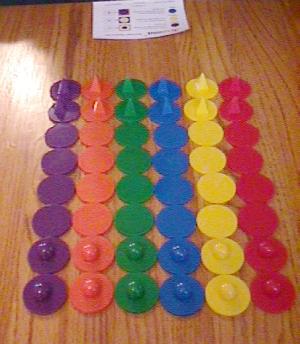
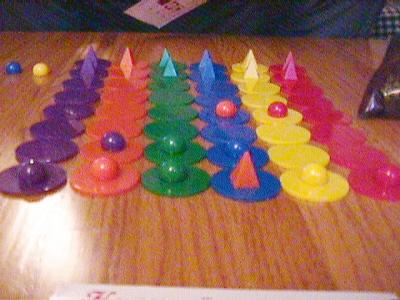
1. Kroma setup.
2. Kroma in action.
Also around 5:30, John Braley and I started a game of Kroma?, a GameSystem I had recently received for review from Larry Wheeler's company VariGames?. It was a truly brain-burning experience. Even John, an accomplished strategist, said, "This game should come with muscle relaxants or sedatives."
We set the board up with coloured columns in random order, but otherwise played a vanilla game. The object of Kroma is to stalemate your opponent. Each colour in the game represents a power of movement; for example, the purple power allows a piece to move one space orthogonally. However, the purple pieces do not have this power intrinsically; instead, they give this power to any friendly piece of the colour of the space they are on. For example, a purple piece on an orange space gives the purple power (the ability to move one space orthogonally) to the orange pieces. Chad observed the game intermittently and remarked, "Once you learn how to play this game, you'll never be able to play any other games!"
As you might imagine, clarity, in Robert Abbott's sense, is hard to come by in this game. It's hard for beginners to see what moves are even possible for them, let alone to look ahead one or more moves.
I made one big mistake at the start, and played too offensively in the midgame. Toward the end , I was down to four pieces. At this point, John remarked I was coordinating my pieces well because I had so few pieces to coordinate (by which I assume he meant I was not wasting any colours; each of my pieces was giving an ability to another piece). At this point, I lost a piece and was down to three. I made a forced move, lost another piece, and couldn't move any more. I was stalemated with two pieces left, which somewhat called into question John's estimate at the beginning of the game that the easiest way to stalemate your opponent is to capture all of his pieces. However, it's pretty clear that it's important to capture as much of your opponent's material as possible.
Because of the lack of clarity, John jokingly suggested a "bluff" variant: your move is legal if you can convince your opponent it is legal.
Our game took about two hours.
--Ron_Hale-Evans?
After the Age of Renaissance game, Star_Munchkin?, the card game that (near as I can figure) satirises teeny-bopper role-players and Trekkies. Jon Tanner walked away with this one; below is a picture of the "winning Munchkin":
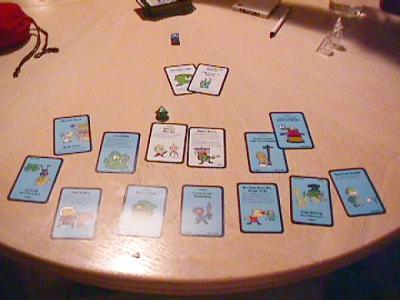
As stated above, the winning Munchkin.
Scores
| PLAYER | SCORE |
| Jon T | 10 |
| Dave H | 9 |
| Steve D | 7 |
| Jeff R | 7 |
| Nat D | 6 |
| Dave A | 4 |
When Jon Tanner returns to SC, I think we owe him a prize. I believe he and Jeff Rosenfeld left around 8:30, right after the game ended.
--Ron_Hale-Evans?
I didn't think it was possible to make Star Munchkin take two hours to play, although in retrospect, I don't know why I thought that. Paying too much attention to the light goofy nature, and ignoring the ominous tones inherent in the word "Munchkin," I guess. We ended up going through the Door deck almost twice. I was actually playing to lose for about ten or fifteen minutes in the middle, when we had some players at level 6 or so and I was at level 1 or 2, ("when will this torment end??") but then a burst of good luck kicked me up to 4 or some such, and I quit being a bad sport. Or less of a bad sport. Something like that.
--Dave_Howell?
This game dragged on entirely too long for such a light game. Nat and I were both cyborgs for most of the game, at least (so we were still a compatible couple...) --Steve_Dupree?
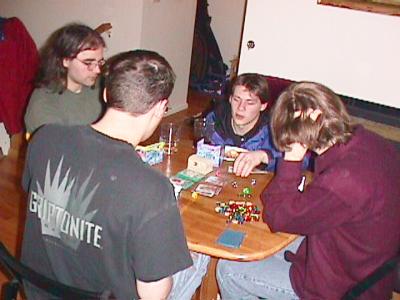
1. Everyone is frightened and confused except Chad, who for once does not look dubious.
2. Steve receives feedback from Alex (lounging Roman-style).
Around 7:35, a playtest of Steve Vall\xE9e's game prototype Maiestas? started in the livingroom. I won't tell you much about this game because it is a prototype, except that it is a blind bidding game set in the Roman Empire. I have played an earlier version, and it was quite good. I don't have any scores for this game, but I gather it ended around 8:30 and the participants sat around and discussed the merits of the design until about 9:00.
Good luck debuting this game at the Gathering of Friends, Steve! It plays well, and it looks professional.
Scores
| PLAYER | SCORE |
| Alex R | 2/2/3 |
| Chad McD? | 2/2/2 |
| Steve V | 2/2/2 |
| Eric Y | 0/0/3 |
--Ron_Hale-Evans?
Scoring in Maiestas works like in Tigris and Euphretes, but with only 3 colors. Players compete to control cities (giving resources) and characters (which cost resources to corrupt, and score points in one of three different colors), among other things. Going into the final round, we knew the score was very close between myself, Chad and Steve. I had 2 points in each color, and was trying to prevent others from achieving the same. Finally, it looked like I wasnt going to be able to do that, so I focused on winning another character for another blue point, which would improve my secondary tiebreaker, sending my score from 2/2/2 to 2/2/3. When we revealed our socres, it turned out that this was enough, as both Chad and Steve had managed to score 2/2/2.
Good luck Steve at the Gathering!
--Alex_Rockwell?
From about 7:40 to 8:50, John B, Dan C, Alex S, and I played two quick games of Give_Me_the_Brain?, the CheapassGames card game about zombies performing menial, sometimes literally brainless tasks, in the Fast Food Restaurant of the Damned. John won the first game, and I won the second (as is right and proper). John was awarded a toy Chinese dragon, and Alex S remarked, alluding to the JohnFactor, "Now Ron will have to write down that John wins another game he claims not to understand!" (Indeed, John claimed he didn't understand until the second game that night, which was at least his third game in total, that you need the Brain for task cards with the Brain icon, and don't need it for ones without it.)
Dan C and Alex S left around 9:00. Alex R said Eric Y was going to give him a ride home so they could play Netrunner together later. That left four people playing Acquire, four people playing El Grande, and John and me. I suggested Reiner Knizia's Scarab_Lords?, which I had been eager to play, but John said he would rather not play another card game, because he has discovered lately that he enjoys using his Chess ability (John is a Chess master) to analyse board positions in almost any other board game.
John and I talked politics for a while, then left around 9:40. (Did anyone else run into a police roadblock on the way home?)
Comments from the players?
--Ron_Hale-Evans?
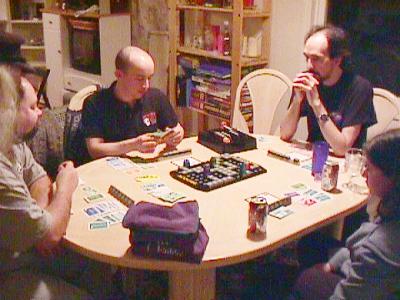
Dupree family business versus the Daveglomerate
Around 8:30, the Duprees began playing against the Daves (Dave Adams and Dave Howell) in a partnership version of Acquire -- technically, the version known in Seattle Cosmic as "Dave's Variant". (See the warning under "Acquire" in this 2001 newsletter.) I left before the Acquire game finished, but bearing the previous warning in mind, I'll wager that the Daves won this game. Was I right?
Scores
| PLAYER | SCORE |
| Dave A | ??? |
| Dave H | ??? |
| Nat D | ??? |
| Steve D | ??? |
Scores? Comments from the players?
--Ron_Hale-Evans?
I don't recall the scores, but you lose the wager, Ron. The first merger of the game was very beneficial to the Dupree team, and Dave Inc. never recovered. At one point, Dave A gave me a pointed look clearly intended to say "What on earth do you think you're doing???" when I played a tile that merged two firms in which the Dupree's had the lead position. The problem was, I'd been unable to purchase stock for three turns due to lack of cash, and I felt that the longer I was paralyzed by that, the bigger their lead would get, and this particular merger would put some cash back in my hand.
Although, in the end, Dave A may owe his loss to the fact we played his variant, inasmuch as his fate would not have been tied to mine if he had not. I managed to misplace tiles twice during the game, which is a real problem in Acquire. We caught the second time I did it. "Hey, that's not 3B, that's 5B!" "Oops! Ok, here's the 3B tile." "No, it's too late to change, you played the 5B, and you can't take it back." "But I played it onto the 3B square." "Well, now we know you have both of them." "Er." "Hmm."
We didn't discover the first time until the game was over, and I didn't realize it was my mistake until we'd already cleaned the game up, although I think everybody suspected it had been me, given that I'd done it once before/after. I'd been 'dealt' an adjacent pair of tiles, 3A and 4A. Naturally, I built a hotel with them, and invested in it. Alas, I managed to put the 3A tile onto the 5A square, and covered it with the cute building. Had the 5A tile been drawn during the game, we might have discovered the error. My original mistake and the bad luck of not drawing the 5A tile were two major contributors to the fact that the tiny little 2-square hotel chain was still intact on the board at the end of the game. Those of you familiar with Acquire will recognize that a hotel chain that doesn't grow, and isn't absorbed by another, is not a winning asset.
My apologies to my Acquire associates. The Acquire board is a good example of a non-multimodal game component. Sigh.
--Dave_Howell?
Both of our scores beat both the Dave's scores at the end. Nat beat me by a few hundred, IIRC. I made a mistake early on, which I was sure would cost us the game, by making the hotel chain Nat founded on her first chain 4 tiles big. This, I thought, ruined our chances of getting our hotel chain eaten, which is as we all know a Bad Thing (tm) in Acquire. It turned out that I drew enough tiles to make a nearby hotel chain the same size, and I had the merging tile for the two chains. As usual, the person (or team) who gets cash in the first merger has much more flexibility and a better position for the rest of the game. Both Daves completely ran out of cash, and Nat and I were able to arrange our share purchases to just beat their holdings in a few cases. Also both Daves bought heavily (10 shares) into Dave H's Quantum chain, which never merged or even grew the entire game. Again I luckily drew the tiles needed to merge that chain, and I just held onto them the whole game. Dave H's misplay of tile 3A was another of the merge tiles for that chain, and the 4th possible merge tile never got drawn. That was just bad luck.
--Steve_Dupree?
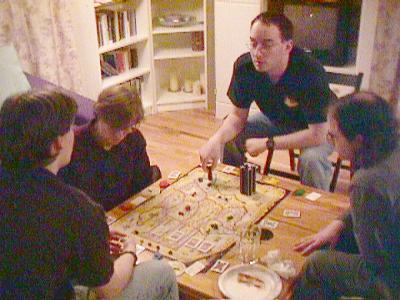
1. Steve is tallest, but is he El Grande?
2. El Grande board.
Around 9:00, four players started a game of El_Grande? in the livingroom. I left before the game finished, so don't have any scores. Would anyone care to fill them in?
Scores
| PLAYER | SCORE |
| Alex R | 146 |
| Eric Y | 119 |
| Chad McD? | 106 |
| Steve V | 76 |
Comments from the players?
--Ron_Hale-Evans?
I used the strategy of "Get lots of Cabailleros on the board early, and then use some special scoring cards." It worked well.
--Alex_Rockwell?
1. Hmm, are weapons dealers more delightful than flying monkeys?
2. Duprees and Daves again.
I wasn't present for this game. Anyone have scores? Rankings? A good story or two?
--Ron_Hale-Evans?
The only other game I know of that took place after John and I left was Netrunner, in which Alex R played Eric Y. Both sides had publicly vowed on the mailing list to bring "fun" decks, which were less likely to win but more fun to play.
The Netrunner mania of Alex and Eric rolls on.
Scores
| PLAYER | SCORE |
| Alex R | ??? |
| Eric Y | ??? |
--Ron_Hale-Evans?
I brought a fun deck, it just happened to be a lot more powerful that the decks Eric was using. Sigh....
For me, fun is: "Using some cool cards, such as Liche and Priority Requisition, which wont be as powerful as the 'top' decks, but still having a solid, efficient deck." This is apparently not Eric's definition.
My corp deck was "Kazaa", which featured the cards Information Laundering and Rockerboy Promotion to get money. (Both of which fit well with Kazaa). It also had some traps and viruses (which you can get off Kazaa if you arent careful). My ice included some extremely big ice like Liche, which I could help pay for with the Agenda Priority Requisition, and the Sys Op Dr. Dreff, to further symbolize the dangers. I figured it would be significantly less powerful than the fast advance corp decks I have used before.
I also had a corp deck named AOL, which was based on killing the runner, becasue, well, I dont like AOL. The game went: Turn 1: I gain money and play no ice. Eric's turn: Run gainst me and plays a couple things. Turn 2: I play chance observation, tagging him because he ran, and Urban Renewal, dealing 5 meat damage. I couldve done 2 more meat damage, but that was enough for the kill. It was very stupid and worked just like I expected it to. If my opponent plays an Emergency Self Construct, I concede. If they dont run, I advance agendas with no ice, so that either they must run or let me win. WHen they run, I use trace cards which give tags that are playable if the runner ran last turn, and then I kill them. Its very stupid, but I thought it was a lot of fun to play once. For the corp at least. ;)
My runner was "Pistachio" named after the character in the (bad) movie "Master of Disguises". This was because I used both Cloak and Mystery Box, and I had run cards for running against HQ and R&D such as Library Search and All Hands, which depend on using no noisy icebreakers. (Thus being hidden and quiet). I also had lots of Bodyweight Synthetic Blood and Jack and Joe to draw cards, and Score, along with Shell Traders / Lucidrine to get bits.
Basically, all the games werent very interesting because Eric's decks (which he didnt build, I think), were too slow to do anything before I won. As the runner, he was unable to ever draw a Sentry breaker.
In short, I thought it was fun to replace the win cards with less powerful, more interesting and fun cards, but keep the card drawing and bit gaining elements of the deck solid. Eric thinks its fun to replace most of the bit gaining/card drawing from a "powerful" deck with more interesting cards.....which means the deck is slow and only gets to actually play a few cards during the game. I would assert that one can make decks which are both powerful and fun, but Eirc seems to have an aversion for playing powerful decks.
Anyway, I think that the best way for us to play together might be to play sealed deck. That is: Get a starter deck, take out 15 cards of our choice so its 45 cards, and play those against each other. But that pretty much eliminates the deckbuilding aspect.
--Alex_Rockwell?
My personal theory on why Alex won all the games is based on an experience I had with a friend of mine named Kathy. She was the person who first got me roped into playing Netrunner again after years of neglect. We both had decks, but would often forget to bring them. So sometimes I'd visit her and I'd use one of her decks so we could play. Sometimes she'd drop by, and we'd decide to play Netrunner, so she'd just borrow one of mine.
Despite the fact we only had a few decks, and each of us was very familiar with the others' decks (having played against them many times), not once did one of us beat the other with their own deck. I didn't notice this until we'd tried this three or four times (with multiple games each session). I think both the intimate knowledge of a deck that comes from personally selecting every card in it, combined with the fact that when you build a deck, you're probably building to your playing style and strengths, has a lot more influence than you might think.
Eric hadn't thought he'd make it to game night, so he didn't have his decks. He was playing with mine, and mine are (I think) even quirkier than Eric's. I tend to build slower decks in general, and I think the combination of Eric playing quirky slow decks that he didn't build against a good player and deckbuilder with a penchant for fast decks resulted in a pretty lopsided experience, alas.
Oh, and here's a challenge for Alex: see if you can build a deck (corp or runner) that isn't a total loser, but has no cards that gain bits. I have at least one corp in my box that meets that description . . . .
--Dave_Howell?
Ok, this is a good challenge. I assume that by no cards that gain bits, I cant use any cards like Cloak or Zetatech Softare Installer that provide bits each turn, or any other such card that gives me a bit in any way, at all. (Else my Clown deck from before already fits this.) Further, I will assume that Shell Traders counts as gaining bits. (I've played a deck online using many of these, which gains no bits, and works great. SO the only way I can ever get a bit for any purpose is "take an action to gain a bit".
I would think that a rent to own deck would be great for that, but I dont have the cards for it, so thats out. ;)
I'll make decks based on this challenge, and I think they will be a good match for the level (i.e. speed) of decks that you and Eric like, as not having bitgainers will slow me down a lot.
I assume that something which lets me play or rez cards for free (usually at some cost or difficult penalty), doesnt count as giving bits? So I could make my corp a modified version of my priority requisition deck, and thus still have a way to get a couple big ice out? I dont have Rent-to-own Contracts, so I wouldnt exactly break the mechanic...
--Alex_Rockwell?
Were there any games that I missed entirely? If so, please insert them above.
Before people left at the end of game night, they helped Dave and Kathy move their hot tub and reseed grass where the tub was -- an interesting activity that does not occur every game night. :)
Thanks to Dave Howell for the Munchkin shot, and keeping score. Thanks to Chad McDaniel for adding his own photos to this newsletter. And thanks again to Marty_Hale-Evans?, who cast her keen editorial eye over the newsletter, and helped with the photo captions.
--Ron_Hale-Evans?
Saturday, 12 April 2003, 5:00 PM at the house of Tim Higgins in Mill Creek (Bothell). Come play for fun and FABULOUS PRIZES!
Remember, Seattle Cosmic Game Night occurs every weekend, in one of three locations: Kent, Mill Creek, or Tukwila. Email Ron Hale-Evans for a full schedule and directions. If you come, please bring a snack or drink to share (cookies, chips, soda, juice, etc.)
The AgogProject is a philanthropic project of the Center for Ludic Synergy and Seattle Cosmic Game Night. The aim of the project is to provide game rules and equipment to hospitals, for use by patients and visitors. You can support the Agog Project by buying games via our Funagain affiliate program, by buying Seattle Cosmic Gear, and in a number of other ways. See the AgogProject page for more details.